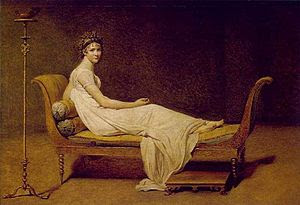On Listening to Georgs Pelecis on a Particularly Terrible Day
By Edward Moore
Jacques-Louis David (1748-1825), The Children of Niobe
A piece by the composer Pelecis, entitled “Nevertheless” takes me back to an old love-making scene (and I use the word “scene” carefully, for no real loving occurred, just a fantasy reaction) … Anyway (I almost wrote “nevertheless”) something cold and calculating in me was born that night … or perhaps not born but encouraged to tickle the hyper-nervous tendrils of my imagination. It is often tempting to use adjectives like “tragic” or “revelatory” to describe moments that are really just selfish jaunts into the domain of the sensual. I love sensuality, and the physical form … What did Wallace Stevens say?
Beauty is momentary in the mind –
The fitful tracing of a portal;
But in the flesh it is immortal.
The body dies; the body’s beauty lives.
(“Peter Quince at the Clavier” IV.51-54)
The body lives in the taste left on my lips, the sweat that covers me after … After what? Pretending that she was Aphrodite on her crimson shell, or Thetis with the glistening feet coming to console her war-weary … lover? No, the body dies every day, in myriad ways, and only the
noussurvives.
Nevertheless, a fetish cannot be sustained by intellect alone: it requires taste, texture, a certain scent, and (hopefully) words to go with it. To hear a word of sensual kindness from a desirable woman is probably the most beautiful thing the world has to offer a man. But we – or at least I – seek alternatives. This descending motif of Pelecis, in which the violin vies with the piano for supremacy is like one of those rare and wonderful episodes of love-making in which the woman can laugh and the man can get annoyed and both find, in one orgasmic moment, that they love each other more than words or even music can tell!
Some things are terribly funny, like a woman farting in the tub and the man making a crude joke, and then wrapping her in a towel, telling her what a goddess she is, and tasting every ounce of her womanhood with an ardor born of aeons of evolution.
It should be obvious from this that I have, as D. H. Lawrence famously put it, “sex on the brain.” But it’s more than that. It’s a return to origins: to a time when all was new and I could be silly without being branded a drunken fool with a foot fetish by women with whom I used to discourse upon the finer points of Hegelian philosophy.
So now I have turned from Pelecis to Beethoven: quite different effluences of the divine
pneuma. Since I’m on to Ludwig’s violin concerto now, here comes a poem.
A gentle tread upon the grass
How different from the blistering bluesy antics of concrete!
One wants to be surly but can’t (for)
The tired indifferent glance of the world makes us long for friendship.
Tears can fall with power, like an aggressively scraped G-string on a Stradivarius.
But they can rain gently, too, like the tears of Echo as she tried desperately (and ingeniously) to court Narcissus.
It’s the same, really. Remember what Whitman said:
“There is that in me – I do not know what it is – but I know it is in me.”
I would love a woman who would rape me with words:
Who would tear back the dull husk of my noetic diaphragm to reveal the glossy suppuration that festers within.
I would love such an one – not with a love of roses and chocolates, but with a love of Niobe-like contentment with a glorious pissing-off of the gods.
To make something, as
ktisiscreate (which is a Christian term) …
Perhaps to be
demiourgos… That’s better. I want to invite love into the world, not demand it!
When I sit on the shore fishing, I want to catch crabs …
Crabs that will walk backward and return me to the history of my race.
When I make love to a woman, I want to be carried forward, into a world that even my drunken mind can’t conceive.
That is Love.
agape

















.jpg)





